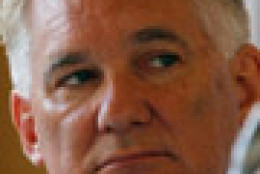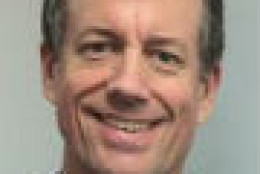National Security Agency
-
Chief legal counselor to NSA says intelligence disclosures may have set back efforts to improve nation's cybersecurity posture because of increasing unease about public-private cooperation, and that it's time to reexamine the digital privacy trust relationship between government and the public.
July 28, 2014 -
The National Security Agency's top lawyer says the Edward Snowden disclosures not only hurt U.S. intelligence gathering capabilities - they may have also damaged the chance of Congress successfully passing cybersecurity legislation anytime in the near future.
July 25, 2014 -
The first change of command at U.S. Cyber Command is complete. General Keith Alexander made way for Admiral Mike Rogers recently. But new revelations from Edward Snowden are a reminder that the first four years of the combination of CYBERCOM and the National Security Agency aren't without controversy. William Lynn was Deputy Secretary of Defense when the Defense Department stood up Cyber Command. He wrote about the strategy behind it in Foreign Policy at the time. He is now Chief Executive Officer of Finmeccanica North America and DRS Technologies. He explained on In Depth with Francis Rose the chain of events that caused DoD leadership to stand up Cyber Command.
July 08, 2014 -
The National Security Agency's collection of Internet data may be massive, but it's constitutional. An independent agency, the Privacy and Civil Liberties Oversight Board, has released a thorough report on how federal agencies track foreigners' communications under Section 702 of the Foreign Intelligence Surveillance Act. The law has come under fire since Edward Snowden leaked documents on NSA programs a year ago. Sharon Bradford Franklin, executive director of the PCLOB, joined Tom Temin on the Federal Drive to talk about the board's investigation.
July 03, 2014 -
The National Information Assurance Partnership, the U.S. implementation of what was supposed to be a faster, cheaper process to verify the cybersecurity of commercial IT products, turned out to be so slow and expensive that few companies could afford to go through it. But officials said they hope a recent overhaul in the procedures will breathe new life into the program.
July 02, 2014 -
Chandra McMahon, Lockheed Martin's vice president for commercial markets, discusses NSA's accreditation system that tests cybersecurity companies against 21 separate focus areas.
June 18, 2014 -
NSA, State and nearly every other agency are developing "fixes" to protect unauthorized employees from taking data. Experts say employees need to understand why the rules are in place and how they benefit both the organization and worker. OMB says one way to improve the situation is by reducing the number of federal employees with security clearances-an initiative that already is underway.
May 21, 2014 -
Former National Security Agency executive Thomas Drake touched the third rail for an intelligence community employee in 2006. He took his concerns about broad, systemic fraud, waste and abuse to the press. The Justice Department indicted him on 10 felony counts. He eventually pleaded guilty to a misdemeanor charge in 2012. As part of our special report Trust Redefined: Reconnecting Government and its Employees, Drake spoke with Federal News Radio executive editor Jason Miller about his decision and its consequences. Read Jason's related article.
May 20, 2014 -
Federal News Radio's Executive Editor Jason Miller speaks with Thomas Drake about his decision to go public with what he called waste, fraud and abuse at the NSA. Drake is one of the few federal employees to be brought up on non-spy charges under the Espionage Act.
May 20, 2014 -
The House is close to considering a bill to drastically change the National Security Agency's surveillance programs. The bill was approved by the Judiciary and Intelligence committees last week. It would end the NSA's practice of storing telecommunications meta-data in its own data centers. For what to expect next, Federal Drive hosts Tom Temin and Emily Kopp spoke to Julian Hattem, a staff writer for The Hill newspaper.
May 13, 2014 -
Gen. Keith Alexander, who will soon retire as the first commander of U.S. Cyber Command, said his organization has matured to the point that it should join the club of unified commands that report directly to the President.
March 14, 2014 -
A pilot project is part of NSA's push to layer commercial technologies and standards on top of one another to achieve security goals more quickly. This approach would replace the government-specific IT solutions that can take years and millions of dollars to develop.
November 27, 2013 -
Despite progress by some agencies in processing FOIA requests, Patrice McDermott of OpenTheGovernment.org says its difficult to measure how open the government really is.
October 23, 2013 -
Gen. Keith Alexander, head of the U.S. Cyber Command and the National Security Agency, said the greatest impact of the ongoing government shutdown on cybersecurity is on the morale of the cyber workforce.
October 16, 2013 -
The bill would conform, mostly, with the House's most recent Cyber Intelligence Sharing and Protection Act. Both the House and Senate bills are trying to find common areas to incentivize private sector companies to share information on any malicious code their firms encounter, both by providing them with liability protections that would shield them from lawsuits that could otherwise follow from sharing information with competitors or with the government, and by convincing them that federal agencies are capable of securely communicating threat information between the private and public sectors.
October 09, 2013







